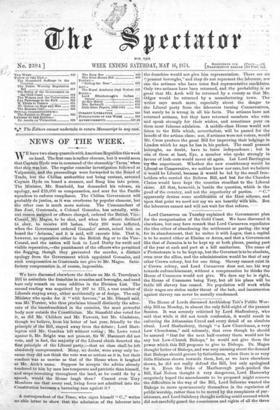A correspondent - of the Times, who signs himself "C.," writes
an able letter to show that the admission of the labourer into
the franchise would not.give him' representation: There are six
peasant boroughs," and they do not represent the:labourer, nor can the artisans who have votes find representative,can4idatps. Only two artisans have been returned, and the probability; is, as great that Mr. Arch will be returned by a county as that Mr. Odger would be returned by a manufacturing town: The • writer says much there; . especially about the danger to the Liberal party front, the labourers turning Conservatives, but surely he is wrong in all his facts. The artisans have not returned artisans, but they have returned members who vote and speak strongly for: their .wishes, and sometimes pour on thee' most fulsome adulation. • A middle-class House. viould not listen to the Bills which, nevertheless, will be passed for the benefit of the artisan:class; nor, if artisans were not voters, would Mt. Cross produce the great Bill for improving their lodgings in London which he says he has in pocket. The small peasant latifoughs, no doubt,. have , to Jekn - independence ; but in one. Of them at least; Eye, a member who spoke. strongly in favour of lock-outs would never sit again. Let Lord Barrington try-612e experiment. Whether the new constituency would he Liberal or Conservative, we neither know nor care, but we believe it.would be Liberal, because it would be led by the small free- holders who carried the -Reform Bill, and but for the Chandos Clause would have kept tlik counties steadfast to the Liberal &thee. All that, however'', is beside the 'question, which is the good of the country, and not the 'Superiority of parties. ," C." apparently desires some nicidliieitiiii of the Hare scheme, and Upon that point we need net'say we are heartily-with hirh. But
the labourers cannot and will not wait for that reform.


































